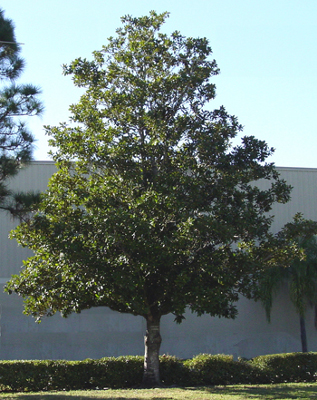Southern Magnolia (Magnolia grandiflora)
Category: Evergreen Trees

Scientifically known as Magnolia grandiflora, Southern Magnolia is a tree that belongs to the family Magnoliaceae. It is native to the southeastern United States in areas such as central Florida, Oklahoma, North Carolina, south Virginia and eastern Texas. In addition, Magnolia grandiflora is also grown in some parts of Central America, Asia, Mexico as well as parts of South America.
This is species of magnolia is a huge and striking evergreen tree endowed with large dark green leaves that grows up to 20 cm in length and 12 cm in width.
Characteristics
The Southern Magnolia has white wide and large flowers that measure up to 30 cm in diameter. These flowers are attractive and extremely fragrant. The white flowers typically have six petals and bloom in late spring from May to June. After flowering, this broadleaf evergreen tree develops spherical cone-like fruiting clusters that usually mature between late summer and early fall.
A mature Southern Magnolia height ranges from 60 and 80 feet and the spread measures 30 to 50 feet. Its crown is pyramidal to rounded in shape. It produces timber that is heavy and hard and is widely grown in warmer areas.
Growth Conditions
The Southern Magnolia grows best in 7 to 9 planting zones. This species of magnolia is mostly considered winter hardy and it becomes somewhat deciduous in extremely cold weather. The best conditions for this tree to grow are organically rich, moist and well-drained loams. It blooms well in full morning sun to partially shady afternoons. It is also intolerant to soil extremes and most urban pollutants. Because these trees are quite huge when they attain full maturity, they should be cultivated in areas that have adequate space where they can expand.
Uses
Its timber is used commercially to make pallets, veneer and furniture. In addition, the Southern Magnolia tree is an amazing specimen flowering tree.
It is worth noting that this species of magnolia does not have serious disease or insect problems.

 Back To Category Evergreen Trees
Back To Category Evergreen Trees